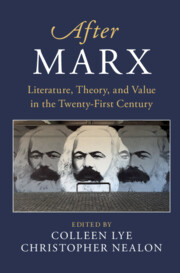Book contents
- After Marx
- After Series
- After Marx
- Copyright page
- Contents
- Contributors
- Acknowledgments
- Introduction
- Chapter 1 Black Marxism and the Antinomies of Racial Capitalism
- Chapter 2 Eco-Criticism and Primitive Accumulation in Indigenous Studies
- Chapter 3 Screening Insurrection: Marx, Cinema, Revolution
- Chapter 4 Marxist Ecology and Shakespeare
- Chapter 5 There Is No “More Commodification”: Periodizing Capitalist Transformation
- Chapter 6 The Irreconcilable: Marx after Literature
- Chapter 7 The Rise and Fall of the English-Language Literary Novel since World War II
- Chapter 8 Literature and the State
- Chapter 9 Post-Soviet Aesthetics
- Chapter 10 Lu Xun’s Literary Revolution in Chinese Marxism
- Chapter 11 Latin American Literature and Dependency Theory Today
- Chapter 12 Industry Culture: Labor and Technology in Marxist Critical Theory
- Chapter 13 In Service to Capital: Theater and Marxist Cultural Theory
- Chapter 14 Hidden Abodes and Inner Bonds: Literary Study and Marxist-Feminism
- Chapter 15 Poetry and Revolution
- Index
- References
Chapter 7 - The Rise and Fall of the English-Language Literary Novel since World War II
Published online by Cambridge University Press: 12 March 2022
- After Marx
- After Series
- After Marx
- Copyright page
- Contents
- Contributors
- Acknowledgments
- Introduction
- Chapter 1 Black Marxism and the Antinomies of Racial Capitalism
- Chapter 2 Eco-Criticism and Primitive Accumulation in Indigenous Studies
- Chapter 3 Screening Insurrection: Marx, Cinema, Revolution
- Chapter 4 Marxist Ecology and Shakespeare
- Chapter 5 There Is No “More Commodification”: Periodizing Capitalist Transformation
- Chapter 6 The Irreconcilable: Marx after Literature
- Chapter 7 The Rise and Fall of the English-Language Literary Novel since World War II
- Chapter 8 Literature and the State
- Chapter 9 Post-Soviet Aesthetics
- Chapter 10 Lu Xun’s Literary Revolution in Chinese Marxism
- Chapter 11 Latin American Literature and Dependency Theory Today
- Chapter 12 Industry Culture: Labor and Technology in Marxist Critical Theory
- Chapter 13 In Service to Capital: Theater and Marxist Cultural Theory
- Chapter 14 Hidden Abodes and Inner Bonds: Literary Study and Marxist-Feminism
- Chapter 15 Poetry and Revolution
- Index
- References
Summary
This chapter outlines the rise and (partial) fall of the mainstream English-language literary novel since WWII. The heights of success of the literary novel required that readers have leisure, focus, and access to public institutions that support literary study and activity. After WWII, literary work was supported by the surge in university enrollments built upon the postwar period’s remarkable economic dynamism, which afforded state-supported higher education and high rates of secure employment. In more recent years, however, austerity governments increasingly defund humanities education and literary arts programming. Students and aspiring writers, indebted and anxious about pathways to employment, are induced to avoid literary study and work, to be risk-averse and market-facing; and people simply do not feel compelled to spend what little they have for entertainment on expensive books. The avowedly literary branch of the mainstream industry has been contracting for these reasons, while other forms of reading and writing cultures (for instance, self-publishing and texts designed for smartphones) have emerged into a more dominant position.
- Type
- Chapter
- Information
- After MarxLiterature, Theory, and Value in the Twenty-First Century, pp. 116 - 130Publisher: Cambridge University PressPrint publication year: 2022
References
- 1
- Cited by

